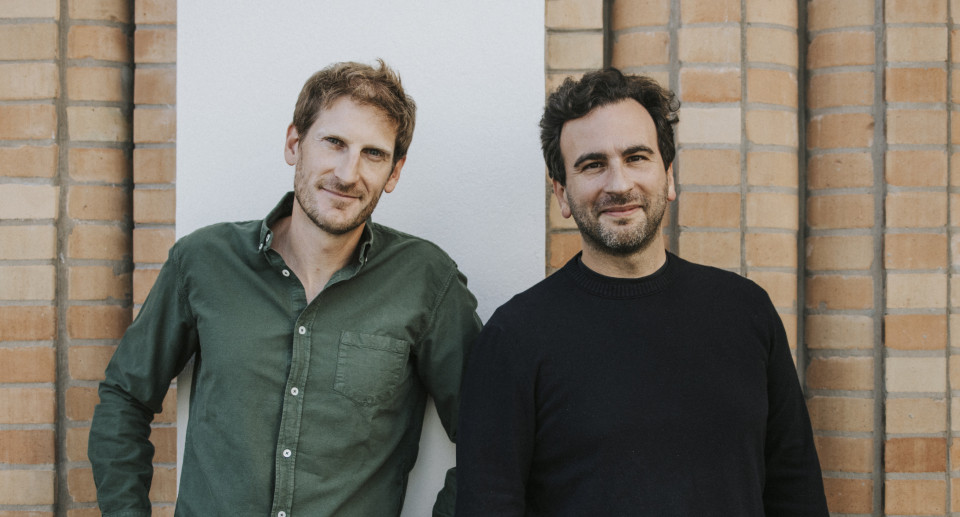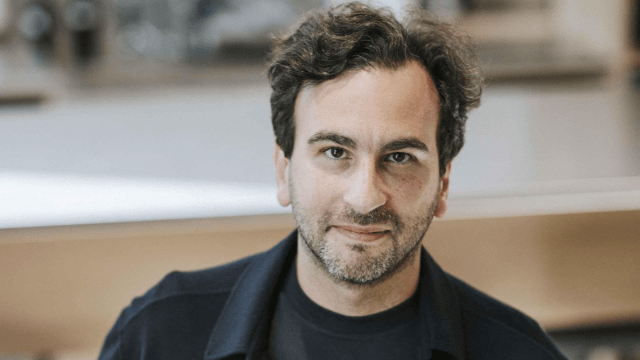Steve Anavi, an EPFL master’s graduate in microengineering, is a co-founder of Qonto, a leading provider of fully digital financial services for small businesses and the self-employed. In 2022, his company was the highest valued startup in France. He spoke with us about the factors behind his success and the challenges he’s faced as an entrepreneur.
Before talking about your career, can you tell us a little bit about yourself personally?
It may sound cliché, but one of my big personal interests is traveling and learning from the places I visit. It’s no coincidence that I went to Switzerland and spent some time in Japan for my degree. Regarding my cultural interests, I’m a big fan of post-World War II painting and I enjoy reading novels and management books. My values include having the courage to try new things – even if you fail – as well as integrity and a strong work ethic. My job is a big source of satisfaction for me, but I spend most of my time outside work with my wife and our two children.
What brought you to EPFL?
I grew up in France but I’d already heard about EPFL: my sister went there for her mechanical engineering degree and my father attended its predecessor, EPUL. As a child, I was the geek of the family – I loved taking computers apart and putting them back together. So when I got older, enrolling in EPFL’s microengineering program seemed like the natural choice. I completed my master’s thesis at the University of Tokyo in 2005. I was really impressed by Japanese culture and have adopted some of its aspects at my company, such as the lean management principles that were originally developed at Toyota.
Why did you decide to complete an MBA at such a young age, before you were even 30?
After graduating from EPFL, I didn’t necessarily want to work as an engineer in the traditional sense. I took a consulting job with Deloitte in 2007 and found myself part of a fairly young team with a strong entrepreneurial spirit. I enrolled in the MBA program at INSEAD in 2011, attending first its Singapore campus and then the one in Fontainebleau. The MBA helped build up my self-confidence and opened up my horizons because it let me meet extremely talented people in a range of fields. The MBA was also a great complement to my engineering background. After graduating in 2012, I joined Groupon as director of operations, where I developed my management skills.
 Steve Anavi (right) and his business partner Alexandre Prot
Steve Anavi (right) and his business partner Alexandre Prot
You’ve known your business partner, Alexandre Prot, for a long time. When looking for someone to start a business with, how can you be sure you’ve found the right person?
Alexandre and I have known each other since we were children and went to school together. One evening in 2012, we got to talking about our plans for the future and realized we’d like to work together on a new venture. We decided to become business partners even before we had a clear idea of the business we wanted to start.
For me, teaming up with Alexandre was a natural choice. People often say you should look for a business partner with complementary skills, and I’m sure that brings a lot of benefits. But in our case things were a little different – Alexandre and I have the same values and goals and we enjoy fleshing out our ideas together. It was also the right time for us personally, as Alexandre had just left his company and I was thinking about doing the same thing.
The factors that make you successful in the beginning can eventually hinder your growth.
Steve Anavi
You created your first business – Smokio, which made connected devices – in 2013. What did you learn from this experience that helped when you founded Qonto in 2016?
When we were thinking about our first venture, there was a lot of buzz around connected devices and the internet of things. At the same time, cigarettes were the leading cause of preventable death. Putting these two facts together gave us the idea for Smokio, which sold the world’s first connected electronic cigarettes. This experience proved that Alexandre and I make a good team. For instance, although the failure rate is high among new businesses, Smokio was fairly successful and was acquired in 2015. The experience also showed us that we were well-suited to the pace and intensity of life as entrepreneurs.
However, launching a physical object on the market is a tough endeavor because the iterations take a long time. That was certainly a factor in our decision to focus on the digital space with Qonto. Also, the market for electronic cigarettes was fairly limited. For our next venture we wanted to address a broader market with products that are relevant to more people.
What was the unmet need you saw in the banking sector that you wanted to address with Qonto?
As entrepreneurs, we saw firsthand the problems that SMEs and micro-businesses can have obtaining financial services. For instance, they often have to work with many contacts at a given bank – and those contacts can be hard to reach. It can be complicated for small businesses to make wire transfers of a sizeable amount, and service levels are often disappointing. Those are problems we ran into ourselves, and when we asked around, we found out we weren’t the only ones. To give a quantitative example, the net promoter score for banks – that is, the probability that a customer will recommend a bank – is actually negative. When we coupled this fact with the size of the SME and micro-business market, which in the eurozone is around €50 billion, and the fact that no financial services provider effectively serves this market, we decided to launch our business.
You came back to EPFL for the Startup Champions Seed Night in 2019, when Qonto had 150 employees. Five years later, you have over 1,600. How have you been able to manage such rapid growth?
The key has been our capacity to adapt. When starting a business, the factors that make you successful in the beginning can eventually hinder your growth. You’ve got to constantly reinvent your company, which means instilling a dynamic culture and encouraging things like continuing education and coaching. Those are essential. I’d also point to the way we empower our employees. There’s nothing more gratifying than seeing the people who have been with you for a long time develop and hone their skills.
Diversity has also been a growth driver. We have employees from nearly 80 different countries. Women make up 44% of our employees and half of our management team. By bringing together people from a range of backgrounds, cultures and experiences, we’ve been able to build a whole that’s greater than the sum of its parts.
Artificial intelligence is a hot topic today. Is it a priority for your company?
It’s a subject I’ve personally been interested in for a long time. I studied neural network image processing, which was one of the first kinds of generative AI, for my master’s thesis. At Qonto, we use AI to process and sort information so that it’s easier for our employees to grasp, thus helping them do their jobs. We’re exploring the possibility of making this innovative technology available to our customers too, for example by streamlining document generation and giving them a better understanding of their transaction activity.
The things CEOs do in their day-to-day jobs can lead them to believe that customer relations isn’t part of their role, and they can quickly lose touch with the reality on the ground.
Steve Anavi
Qonto became a unicorn in 2022 and was even France’s most highly valued startup. What do these achievements mean to you?
A company’s valuation is a fairly objective metric. It’s based on the company’s financial performance, growth potential, how strongly investors feel about its business case and the prevailing market conditions. Our achievements in 2022 were highly encouraging, for both our shareholders and the employees whose hard work made them possible. We also got a lot of media attention. But these achievements didn’t change the work we do on a daily basis.
You mentioned your shareholders. One of them is Chinese heavyweight Tencent, which has recently faced legal and financial difficulties. Has that affected Qonto?
No it hasn’t, Tencent is just one of several investors. We believe it’s essential to maintain a diversified investor base, and we’re fortunate to have between 10 and 15 institutional investors from numerous countries, including France, Germany and the US. This diversity gives us a complementary skill set to draw from, since each investor has its own strengths and areas of specialization. Tencent for instance has excellent knowledge of the fintech industry because it’s invested in many companies operating in this field.
You’ve started to expand internationally, building on your success in France. What are your short- and medium-term goals?
The EU has 25 million SMEs, which account for 99% of all companies in the region and 50% of its GDP. So it’s a huge market. As of September 2024, we operate in eight countries: Germany, Spain, Italy, France and our more recent additions of Austria, Belgium, the Netherlands and Portugal. These new additions are countries where we tested our services and got a good response – the banking challenges that small businesses and the self-employed face there are the same as those faced in other countries in which we have operations. We eventually plan to penetrate new markets, but since we just opened these four offices, that isn’t a priority for now. Our business development goals for the near term will be to anchor our presence in the countries where we already operate.
Financial services providers aren’t the first companies that come to mind when talking about driving change in the area of sustainability. How are you making a difference at your level?
The first way relates to the kind of business we run. Qonto is a payment services provider – we aren’t actually a bank in the strictest sense. Banks are some of the worst-rated firms in terms of sustainability since they often invest in polluting industries or finance companies in those industries. That’s not the case at Qonto. Also, the fact that we’re a fully digital firm with no points of sale automatically limits our carbon emissions. And because we follow lean management principles – that is, we aim to eliminate waste in our business processes – we naturally take a sustainable approach.
Taking the Archimedean Oath at EPFL’s graduation ceremony was a decisive moment for me, opening my eyes to how important it is to use our skills in an ethical manner.
Steve Anavi
That said, we’re conscious of our impact and believe we have a collective responsibility to reduce it. We’ve set the goal of shrinking our carbon emissions relative to our growth – by 5% in 2023 and 10% in 2024. But instead of launching initiatives designed only to cut our emissions, we’re taking a big-picture view and aiming to reconcile business performance with sustainability.
Today it’s hard for us to act directly on the emissions associated with our servers – that’s mainly in the hands of our cloud service providers. And here, I think engineering schools like EPFL have an important role to play. The way IT systems and other electronic devices are designed can have a major influence on their carbon emissions.
What have you learned from your experience as an entrepreneur?
So many things that I could write a book on the topic! For instance, I’ve learned how challenges can come at you one right after the other. That’s something I like and was looking for, but you have to be able to keep up the pace and constantly reinvent yourself. I’ve learned how important it is to hire the right people, because you’re counting on your employees to get the job done and because it’s a great opportunity to learn from others. And I’ve learned how important customer relations are. The things CEOs do in their day-to-day jobs can lead them to believe that customer relations isn’t part of their role, and they can quickly lose touch with the reality on the ground. And I’ve seen that it can be lonely at the top, especially when you’ve got to face responsibilities on your own – even though Alexandre and I are lucky to have each other.
How did your time at EPFL prepare you for your role today?
In becoming an engineer, you also become an entrepreneur. That’s partly because entrepreneurs must continually solve problems – which is the essence of engineering. And, like engineers, entrepreneurs seek to achieve maximum efficiency in their value chains. This parallel is especially true if you consider that most of the efficiency gains come from technology.
My semester projects at EPFL were very hands-on, which made them key elements of my education. I also have very fond memories of some of my professors, like Philippe Renaud and Peter Ryser, and some of the classes I took, like industrial ecology. Taking the Archimedean Oath at EPFL’s graduation ceremony was a decisive moment for me, opening my eyes to how important it is to use our skills in an ethical manner. I cherish values like these, which EPFL promotes, as well as the School’s diversity, community and everything else it has to offer.
BIO
2006
Graduates with a master’s degree in microengineering from EPFL
2011
Obtains an MBA from INSEAD
2013
Co-founds Smokio, a company that makes connected devices
2015
Co-founds Qonto, a financial services provider for SMEs and micro-businesses
2022
Qonto becomes a unicorn and France’s highest-valued startup
Photos: Qonto - all rights reserved

Comments0
Please log in to see or add a comment
Suggested Articles



